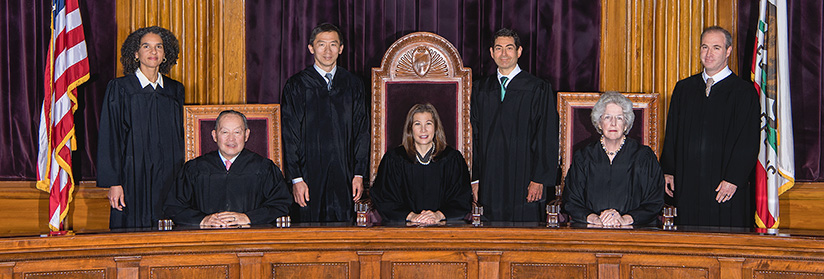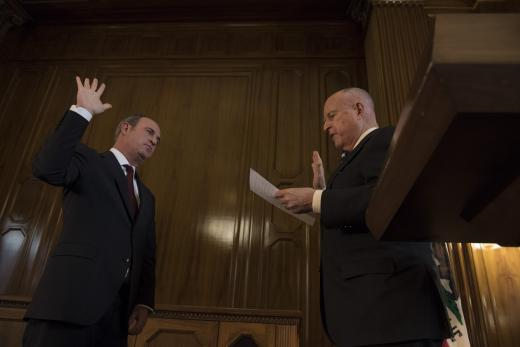
California Supreme Court Justices (courts.ca.gov)
California Supreme Court Rules 5-2 That Prisoners Cannot Possess Marijuana While In Prison
‘It seems implausible that the voters intended to essentially decriminalize marijuana in prisons’
By Evan Symon, August 14, 2021 2:50 am
The California Supreme Court ruled on Thursday that prisoners in California’s penal system could not legally possess marijuana while in prison, overturning a lower court ruling.
The question over whether prison inmates should be able to have marijuana has been argued in courts since Proposition 64, which legalized the usage of recreational marijuana in California, was passed by voters in 2016. Lowers courts wrestled with the issue, with judges agreeing on arguments both for and against it. In 2019, the 3rd District Court of Appeals in Sacramento overturned the convictions of 5 inmates who had been give higher sentences for having marijuana while in prison in California v. Raybon, making possession of an ounce or less be no longer punishable as a felony.
“The plain language of Proposition 64 is clear,” said Appeals Court Justice Vance W. Raye in 2019. “Possession of less than one ounce of cannabis in prison or a similar penal institution is not a felony. The argument flies in the face of the plain language of the statute and common sense.”
Although the appeals court said it was effectively legal to possess as long as it wasn’t consumed, the ruling was immediately challenged by the California Attorney General’s office. After a delay due to the COVID-19 pandemic, the case went before the California Supreme Court this year.
California Supreme Court justices finally ruled on Thursday in a 5-2 decision that the Prop 64 decision by voters did not apply to inmates.
“It seems implausible that the voters intended to essentially decriminalize marijuana in prisons”
“There is nothing in the ballot materials for Proposition 64 to suggest the voters were alerted to or aware of any potential impact of the measure on cannabis in correctional institutions, much less that the voters intended to alter existing proscriptions against the possession or use of cannabis in those institutions,” said Associate Justice Joshua Groban in the majority opinion. “The only mention of the subject is in the text of the measure itself and states the opposite intent in the strongest of terms.”
“It seems implausible that the voters intended to essentially decriminalize marijuana in prisons. We agree with the Attorney General that if the drafters had intended to so dramatically change the laws regarding cannabis in prison, we would expect them to have been more explicit about their goals. While perhaps not illogical to distinguish between the possession and use of cannabis, it is nonetheless difficult to understand why the electorate would want to preclude laws criminalizing cannabis possession in prison, but permit laws criminalizing cannabis consumption in prison.”
“We are sympathetic to the view that existing law creates extreme disparity between how our legal system treats the possession of cannabis generally versus the possession of such a substance inside a correctional facility. That is also true of many other substances, including alcohol. Some may well view an eight-year prison sentence for the possession of less than one gram of cannabis as unduly harsh. The wisdom of those policy judgments, however, are not relevant to our interpretation of the statutory language.”
Only two justices, Mariano-Florentino Cuellar and Leondra Kruger, partly dissented with the majority opinion. The dissent was not due to any issue with drug legality, as they agreed that Prop 64 did not legalize marijuana for prisoners. Instead, they were concerned over the ways prosecutors could continue to file charges and choose the one with harsher penalties when statutes overlapped.
Legal experts noted that the case had been widely expected to be ruled this way by the Supreme Court.
“Prop 64 said nothing of inmates or anything,” noted Santa Barbara County lawyer Dan Jennings to the Globe on Friday. “It was a largely easy appellate reversal. So many other cases have said that marijuana possession is illegal in prison.”
- Bill to Require Law Enforcement Disclosure if AI Was Used To Help Write Reports - August 7, 2025
- Gov. Newsom Files FOIA Request To ‘Expose True Cost’ Of L.A. Federal Troop Deployment for Anti-ICE Riots - August 6, 2025
- California Redistricting: How Newsom’s Plan Will Demolish Hard Fought GOP Gains - August 6, 2025





Phew…
Looks like we dodged a bullet with that vote.
Imagine the mayhem it would create, inmates shanking each other for the newest and best strain of weed. Prison guards getting contact highs. The trades get more intense as cigarettes go out of fashion and joints become the most sought out barter.
5-2 vote says it all.
I thought prison was supposed to be punishment, not a drug pen! Since when was pot allowed in prison? Only in CA!
2 judges thought pot in jail is a good idea? Pot can cause all sorts of violent mental illnesses which would be the perfect storm in prison.
Time to recall 2 judges!
Seems to me prison would be a lot more fun if you were stoned all day until the munchies set in! Some real tough punishment!
Inmates should definitely have access to medicinal cannabis. How is this any different than inmates receiving medication? There are many discrete ways to consume that won’t affect guards and other inmates like tablets, sublingual, liquid drops, patches, gummies. Cannabis is used to control nausea and vomiting caused by cancer chemotherapy, got epilepsy? You can live seizure-free by using cannabis! Slow tumor growth, relax tight muscles in people with MS, stimulate appetite and improve weight gain in people with AIDS. How many inmates have AIDs that could be helped? This isn’t rocket science. Our jailing systems already know how to provide medical care for inmates. You want to outlaw recreational cannabis in jails? By all means, go for it. You don’t see judges allowing the consumption of alcohol.
sure. let them have keg parties too
damn stupid
Cigarettes were legal in California Prisons until 2015, and I actually think prisoners should have access to both cigarettes and joints and the occasional alcohol shot in the canteen. Prison work earns what – something like 50 cents an hour? Call me a softie, but I feel very sympathetic for people in cages. I just do.
They should give them access to marijuana. They are working inside and they deserve to have a little freedom.
Prisons are closed places they are out of sight, very much out of mind for the general population.
While perhaps not illogical to distinguish between the possession and use of cannabis, it is nonetheless difficult to understand why the electorate would want to preclude laws criminalizing cannabis possession in prison.